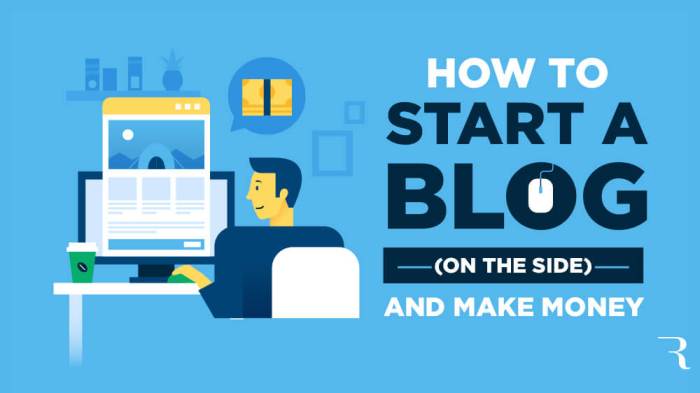How to Start a Blog dives into the world of blogging, offering a fresh perspective geared towards high schoolers who want to make their mark online. From defining what a blog is to monetizing your content, this guide has got you covered.
Introduction to Blogging
A blog is a regularly updated website or online platform where an individual or a group of people share their thoughts, opinions, and expertise on a particular subject. The purpose of a blog is to inform, entertain, educate, or inspire its audience through written content, images, videos, and other multimedia.
Benefits of Starting a Blog
- Establishing an online presence and personal brand
- Sharing knowledge and expertise with a global audience
- Building a community of like-minded individuals
- Monetizing your blog through sponsored content, affiliate marketing, or selling products/services
Examples of Successful Blogs and Their Impact
Some successful blogs that have made a significant impact include:
- The Huffington Post: A news and opinion website that has become a leading source of news and information.
- Goop: A lifestyle blog founded by Gwyneth Paltrow known for its wellness and beauty tips.
- The Pioneer Woman: A blog by Ree Drummond focusing on cooking, home, and family life that has led to a successful TV show and product line.
Choosing a Blogging Platform: How To Start A Blog
When starting a blog, one of the most crucial decisions you’ll make is choosing the right platform to host your content. There are several popular options available, each with its own set of features and benefits. Let’s take a look at some of the most common platforms like WordPress, Blogger, and Medium, and discuss factors to consider when selecting a platform.
WordPress
WordPress is one of the most widely used blogging platforms, known for its flexibility and customization options. It offers a wide range of themes and plugins to help you create a unique blog that suits your style. With WordPress, you have full control over your content and can easily monetize your blog through ads or affiliate marketing.
Blogger, How to Start a Blog
Blogger is a free platform owned by Google, making it easy to set up and use. It’s a great option for beginners looking to start a simple blog without any technical knowledge. Blogger offers basic customization options and integrates seamlessly with other Google services like AdSense for monetization.
Medium
Medium is a platform known for its clean and minimalist design, focusing on high-quality written content. It’s a popular choice for writers looking to reach a wider audience and connect with like-minded individuals. Medium offers built-in social networking features and the ability to earn money through its Partner Program.
Consider the following factors when choosing a blogging platform:
– Ease of use and user interface
– Customization options and flexibility
– Monetization options
– Community and audience reach
– Customer support and resources
– Pricing and scalability
Your choice of platform will depend on your blogging goals, technical expertise, and budget. It’s essential to research each platform thoroughly and consider how it aligns with your long-term blogging strategy and objectives.
Selecting a Niche
When starting a blog, choosing the right niche is crucial as it determines your content focus, target audience, and potential for success. Your niche should be something you are passionate about and have expertise in to maintain consistency and quality in your posts.
Tips for Selecting a Niche
- Identify your interests and hobbies: Choose a niche that you are passionate about and enjoy writing about to keep yourself motivated.
- Evaluate your expertise: Consider your knowledge and skills in a particular area to provide valuable and insightful content to your readers.
- Research market demand: Look for niches that have a demand for content but are not oversaturated with competition to increase your chances of standing out.
- Consider profitability: While passion is important, also think about the potential for monetization in your chosen niche to make your blog sustainable in the long run.
Niche Ideas and Potential for Success
- Health and wellness: With the increasing focus on self-care and healthy living, a blog focusing on health, fitness, and wellness can attract a wide audience.
- Personal finance: Providing tips and advice on budgeting, saving, and investing can help readers manage their finances better, making this niche both valuable and profitable.
- Travel and adventure: Sharing travel experiences, tips, and destination guides can appeal to wanderlust-filled readers looking for inspiration and practical advice for their next trip.
- Food and cooking: A blog centered around recipes, cooking techniques, and food reviews can attract food enthusiasts and aspiring chefs, tapping into a popular niche with endless possibilities for content.
Setting Up Your Blog

When setting up your blog, there are a few key steps to consider to ensure it is successful. This includes selecting a domain name, choosing a hosting provider, and designing your blog to be visually appealing and user-friendly.
Domain Name Selection
Choosing the right domain name is crucial as it is the online identity of your blog. Here are some recommendations for selecting a domain name:
- Keep it short, simple, and easy to remember.
- Avoid using numbers or hyphens, as they can be confusing.
- Include s related to your niche to help with search engine optimization ().
- Consider using your own name if you are creating a personal blog.
Importance of Responsive Design
Responsive design is essential for blogs as it ensures your website looks good and functions well on all devices, including desktops, tablets, and smartphones. Here’s why responsive design is important:
- Improves user experience by providing a consistent look and feel across all devices.
- Helps with , as Google prioritizes mobile-friendly websites in search results.
- Increases engagement and reduces bounce rates by catering to a wider audience.
Creating Quality Content
Creating quality content is essential for the success of your blog. Valuable content not only attracts readers but also keeps them engaged and coming back for more. It helps you build credibility, establish authority in your niche, and ultimately grow your audience.
Generating Content Ideas
Coming up with fresh and interesting content ideas can sometimes be challenging, but here are some tips to help you out:
- Stay updated with industry news and trends to find inspiration.
- Ask your audience what they would like to read about through surveys or social media polls.
- Repurpose old content by updating it with new information or a different perspective.
- Look at what your competitors are writing about and put your unique spin on those topics.
Consistency in Publishing Content
Consistency is key when it comes to publishing content on your blog. Here’s why it’s important:
- Regularly posting content helps you stay on your audience’s radar and maintain their interest.
- Search engines like Google favor websites that consistently produce fresh content, which can improve your rankings.
- Establishing a posting schedule helps you stay organized and ensures that you deliver content in a timely manner.
- Consistency builds trust with your audience, showing them that you are reliable and committed to providing value.
Promoting Your Blog

Promoting your blog is crucial to attract readers and build a strong community around your content. Utilizing various strategies like social media, , and collaborations can help increase visibility and engagement.
Utilizing Social Media
- Share blog posts on platforms like Instagram, Twitter, and Facebook to reach a wider audience.
- Engage with followers by responding to comments, asking questions, and creating polls to encourage interaction.
- Utilize hashtags relevant to your niche to increase discoverability and reach.
Optimizing for
- Research s related to your content and incorporate them naturally in your blog posts to improve search engine ranking.
- Optimize meta descriptions, titles, and alt text for images to enhance visibility on search engines like Google.
- Focus on creating high-quality, relevant content that provides value to readers and encourages sharing.
Collaborating with Others
- Partner with influencers or other bloggers in your niche to reach their audience and gain exposure.
- Guest post on established blogs to drive traffic back to your own blog and increase credibility.
- Participate in blogger networks or online communities to connect with like-minded individuals and cross-promote each other’s content.
Monetizing Your Blog
When it comes to making money from your blog, there are several strategies you can use to monetize your content and turn your passion into profit. It’s important to find the right balance between earning income and maintaining authenticity to keep your audience engaged and loyal.
Different Ways to Monetize a Blog
- Ads: Displaying ads on your blog can generate revenue through pay-per-click or pay-per-impression models. Platforms like Google AdSense can help you place relevant ads on your site.
- Affiliate Marketing: Partnering with companies to promote their products or services through affiliate links can earn you a commission for every sale or lead generated through your blog.
- Sponsored Content: Collaborating with brands to create sponsored posts or reviews can provide a source of income in exchange for promoting their products or services to your audience.
Balancing Monetization with Authenticity
Maintaining authenticity is crucial to building trust with your audience. While it’s important to monetize your blog, it’s equally essential to ensure that the content you create aligns with your values and resonates with your readers. Avoid overwhelming your audience with too many ads or sponsored content, as it can detract from the overall user experience and authenticity of your blog.
Personal Experiences with Blog Monetization Strategies
- Ads: I have found success with Google AdSense by strategically placing ads within my blog posts, resulting in a steady stream of passive income.
- Affiliate Marketing: By promoting products and services that I genuinely believe in, I have been able to earn a significant income through affiliate marketing partnerships.
- Sponsored Content: Collaborating with brands that align with my niche has allowed me to monetize my blog while maintaining authenticity and providing valuable content to my audience.






